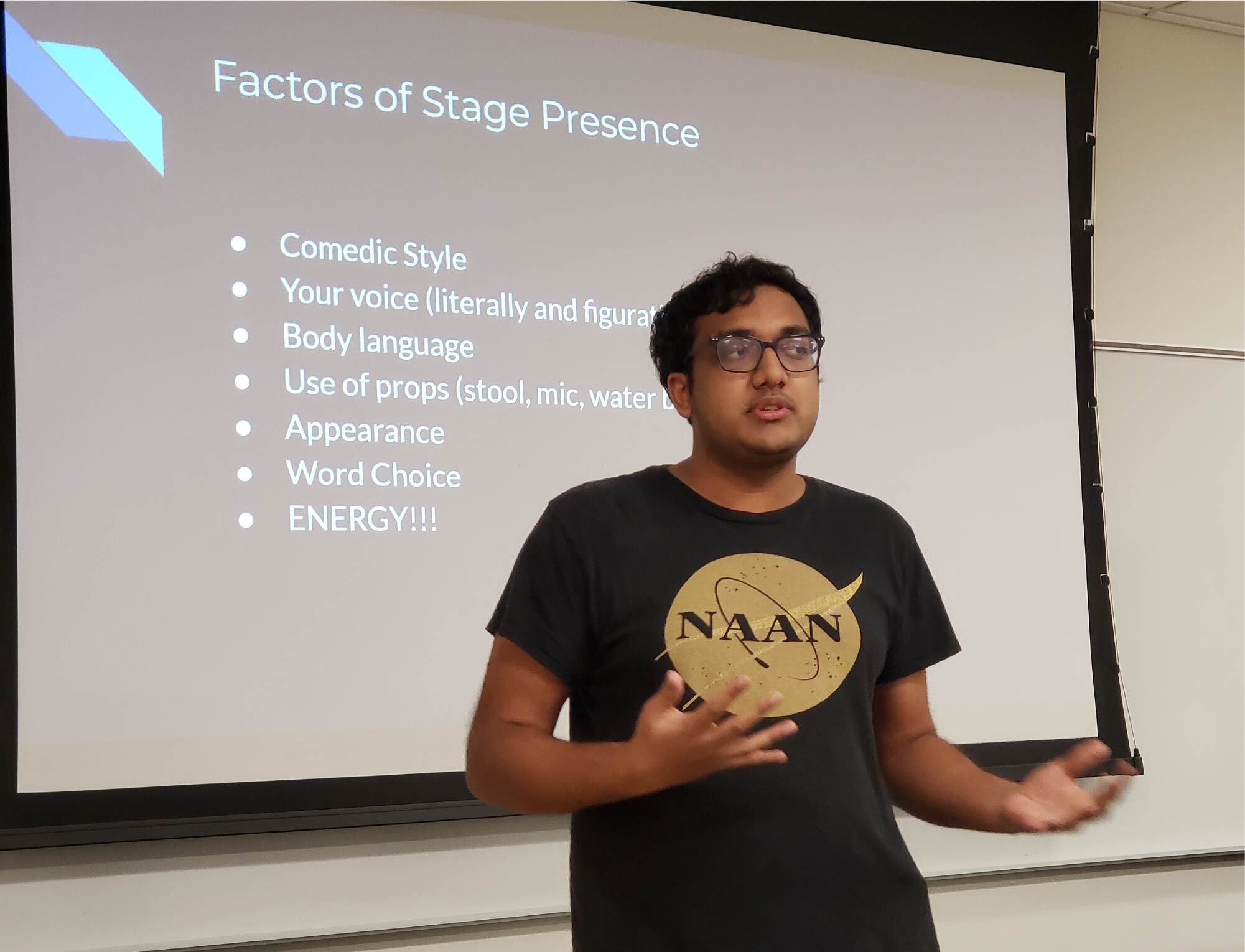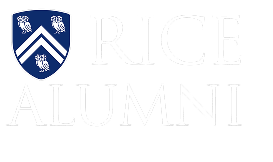Students watch stand-up comedy specials and develop their own comedic personas in this student-taught course, culminating with a 5-minute stand-up routine performed in front of friends and family.
Timing is everything. This idea applies to life, relationships, jumping rope, cooking meat — and it’s what Keshav Wagle ’22 preaches to his students as they write, practice and hone their comedic personas in his student-taught course, COLL 149: Stand-up (Comedy) For Yourself.
Wagle, a senior film and photography major in Hanszen College, teaches stand-up comedy to a class of his own peers. He developed a 15-week curriculum that explores the art of a joke, from strategic pauses to obscure observations, and culminates with a challenging final exam: a 5-minute stand-up set. Assignment by assignment and bit by bit, Wagle tracks his students’ progress from amateur jokesters into great comedic minds.
Since 2006, Rice students have had the opportunity to serve as novice professors guided by the Center for Teaching Excellence’s (CTE) Student-Taught Course Program, and both students and student teachers receive class credit for participating. “The program was started by two college magisters who recognized that Rice students had a lot of passions and interests outside of the classroom and were excited about sharing that with their peers,” said Robin Paige, director of the CTE. These passions and interests have ranged from the sociology of Harry Potter to the art of craft beer, from a breakdown of the boba generation to a tour of the world through food.
Once students decide they want to teach a course, they run their idea by their college magisters and enroll in COLL 300: Pedagogy for Student Instructors. With the help of a faculty sponsor, they flesh out the details of their class, including the semester’s assignments and a grading system. They even sharpen their interpersonal skills to create an effective classroom environment, from leading good discussions to communicating new ideas. Paige, who also teaches COLL 300, describes the program as a tool for students to organize and share their passions, while fostering creativity in others.
Hasan Minhaj, Aziz Ansari, Ali Wong, John Mulaney and Bo Burnham are key units in Wagle’s course. By studying the professionals, students are able to break down the parts of a joke and understand what makes an audience laugh. They then begin a semester-long “joke workshop” where they write jokes, perform them to the class and receive feedback. “On the first day of class, we set boundaries,” said Wagle. “Comedy can be really vulnerable for a lot of people. It’s a place for people to share what’s going on in their lives, and that can be pretty heavy. So we want to make sure we set boundaries.” When students offer feedback, they must adhere to two important points: All feedback must be accompanied by something positive, and all criticism should be as specific as possible. Then it’s back to the drawing board to make revisions. The process of pitching and rewriting jokes repeats over and over until the final exam when students perform a 5-minute stand-up routine in front of their friends and family — and all of campus is invited to watch.
Comedy can be really vulnerable for a lot of people. It’s a place for people to share what’s going on in their lives, and that can be pretty heavy. So we want to make sure we set boundaries.
The spring 2022 students aren’t the only ones who have gotten the chance to learn from Rice’s funniest. Wagle inherited the idea of the class from his O-Week advisor and co-taught versions of the course in 2020 and 2021 with his friend Vikram Aggarwal ’21 (Hanszen). Stand-up comedy is considered a legacy course, meaning it’s been around for years, but each student teacher is responsible for developing a new curriculum and putting their own spin on the content. For this semester, Wagle updated his workshopping methods but made sure to keep the final exam. Last year, he enjoyed watching his students blossom from the first day of class. “It was the most special thing,” he said. “You see how well people develop their comedic persona throughout the semester, and they learn how well they can do. Sometimes I’ll hear a joke in the second week of class, and they keep reworking it throughout the semester. By the end, it’s a completely different joke. It’s so well-refined. It’s really cool.”
Most people who join the class don’t have big dreams of becoming the next Jerry Seinfeld or Amy Schumer. But they all have a unique appreciation for the art of stand-up, and the class gives them the space and community to dig into it. Wagle first experienced this kind of community in the fall of 2020 when he took another student-taught course, Super Smash Theory, which analyzed the popular video game Super Smash Brothers. “I was able to talk to a bunch of people who loved Super Smash Brothers as much as me,” he said. “The course allowed me to make some new friends. I know there are people on campus who love comedy. They just don’t know who to talk to about it.”
The same applies to student teachers. Most participants in the Student-Taught Course Program don’t see themselves becoming teachers or professors; they simply want to build a community around something they’re passionate about. “I would say 90 percent of the students are just interested in sharing something with their peers,” said Paige. “They’re intrinsically motivated to do a good job and see this as a service to their friends, which Rice students take very seriously.”
They’re intrinsically motivated to do a good job and see this as a service to their friends, which Rice students take very seriously.
The Student-Taught Course Program is designed to strengthen creativity, create community and offer unique learning experiences. While students don’t necessarily need to know how to master the perfect joke, stand-up comedy teaches them valuable life skills, including public speaking, offering critiques and implementing feedback. Wagle, who plans to go to dental school, is learning necessary communication tools to succeed in healthcare, taking complex concepts and making them easily digestible. It helps too that comedy helps him keep a light-hearted personality and easily connect with those around him.
When academics and community go hand in hand, transformative experiences take shape. At Rice, curious and imaginative students are surrounded by other curious and imaginative students. The result is a supportive community that feels comfortable and safe to try something outside their comfort zone — and have fun while doing it. “My favorite part is just connecting with more people around campus,” said Wagle. “You’re more of a mentor than a teacher, and you’re on the same level as your students. You meet people in your class, learn new things and see how truly talented they are.”
My favorite part is just connecting with more people around campus.
The CTE recognizes exceptional student teachers in the Student-Taught Course Program, and these students are honored alongside Rice faculty awardees at the university awards ceremony. Stay tuned in April for the announcement of the 2022 winners. See previous student winners.
Keshav’s tips for landing the perfect joke:
The shorter the set-up, the more impactful the punch.
The more feedback you receive, the better your jokes.






